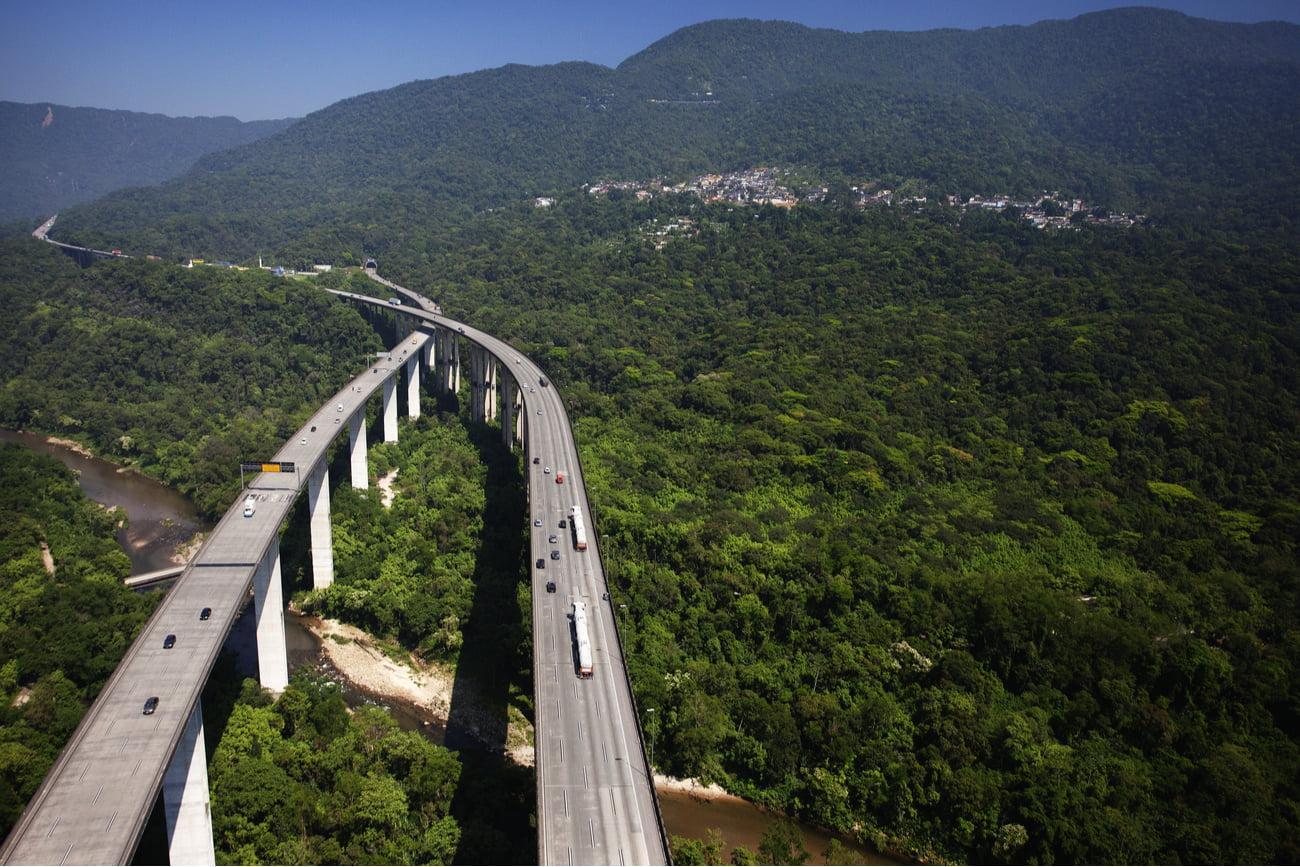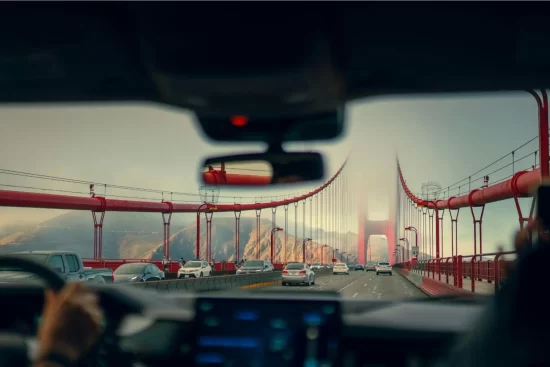
Thinking about visiting Brazil? A car rental can be a good option for getting around. Here’s everything you need to know before renting a car in Brazil and what to expect when driving in Brazil.
Planning a trip to Brazil often comes with the impression that moving around the country is not always simple, and this idea usually makes sense once you understand its size and diversity. Distances can be long, and many regions have limited public transportation, especially when you want to visit beaches, small towns or natural parks that are not connected by frequent flights.
Although major cities and tourist areas offer different ways to get around, some of the most interesting places are easier to reach by car. Renting a vehicle gives you flexibility to adjust your schedule, explore nearby destinations and stay longer where you feel like enjoying the moment. It is one of the reasons many visitors consider driving in Brazil an attractive option.
At the same time, navigating a new country with unfamiliar rules brings natural concerns. Road conditions vary, traffic can be intense in large urban centers and understanding local habits takes a little adaptation. Still, with the right information and realistic expectations, driving can become a practical and safe way to experience more of Brazil during your trip.
This guide brings reliable information and practical advice to help you prepare and make confident decisions on the road.
Driving in Brazil: Requirements you need to know
Understanding the basic requirements helps avoid confusion and ensures a smooth start to your journey.
Visitors can legally drive using their home country driver’s license along with their passport. Many foreigners drive without issues for the first 180 days of their stay as long as the license is valid. Even though an International Driving Permit is not always mandatory, it is recommended when your license is not in Portuguese or English. It helps with readability during traffic stops and at rental counters.
To rent a car, most companies require drivers to be at least 21 years old, although some categories may require 23 or 25. Rental agencies typically ask for a credit card under the driver’s name and may require the license to have been issued at least two years prior. Having everything ready at pick-up makes the process faster.
Brazil drives on the right side of the road, and all signage follows the metric system. Speed limits appear in kilometers per hour, and seat belts are required for every passenger. Holding a mobile phone while driving is not permitted and fines are issued frequently. These rules apply across all states and help create safer conditions for locals and visitors.
Is driving in Brazil safe?
Travelers often ask if driving in Brazil is safe, and the answer depends on where and when you drive. With planning and awareness, driving is generally a reliable way to move around the country.
Large cities such as São Paulo, Rio de Janeiro and Salvador have heavy traffic during busy hours. Motorcycles are very common and may pass between lanes, so keeping steady lanes and checking mirrors often is essential. Many locals avoid driving exactly at peak times because streets can slow down significantly. Doing the same will help you save time and reduce stress.
Safety perceptions vary by neighborhood. Using main avenues, locking doors, keeping windows closed when stopped for long periods and avoiding displaying valuables inside the car are standard precautions. These simple habits help both residents and visitors feel more comfortable in traffic.
Outside urban areas, the experience changes. Highways that connect major cities are usually well maintained, especially those with tolls.
Toll roads offer clearer signage, better pavement and roadside assistance, which adds a sense of security for travelers. Rural and secondary roads, however, may be narrower and have less lighting, so driving during daylight hours is preferable. Many trucks travel long distances, so maintaining safe distances and overtaking only when visibility is good make a significant difference.
Brazil also has strict rules for drinking and driving. The tolerance is very low, so avoiding alcohol entirely before driving is the safest approach. The same applies to mobile phone use. These regulations are enforced regularly, especially in larger cities.
Overall, driving in Brazil for foreigners is safe when done with awareness, preparation and a realistic understanding of local conditions.
What to expect when driving in Brazilian cities?
Cities offer convenience, but they also come with characteristics travelers should be aware of.
Traffic density is one of them. In metropolitan areas, flow can vary widely throughout the day. Navigation apps work well in Brazil, providing real-time updates and suggesting alternative routes. Planning your schedule to avoid late-afternoon peak times helps make urban driving more manageable.
Road surfaces in central areas usually have good maintenance, especially in tourist-friendly neighborhoods. Further away from busy districts, pavement quality may vary and construction work can appear without much warning. Paying attention to road markings and using navigation apps helps anticipate these changes.
Street parking follows color-coded markings. White lines generally indicate approved areas, while yellow lines signal restrictions. Many cities have rotating parking systems managed by digital apps, and parking garages remain the safest choice when you are unfamiliar with the area. They are widely available near hotels, shopping centers and attractions.
Driving on Brazilian highways
Brazilian highways offer scenic drives, comfortable distances and access to regions that would otherwise be harder to reach.
Highways can be busy when leaving large cities during national holidays or summer weekends. If your travel dates coincide with these periods, starting your trip early in the day or choosing a weekday departure can help avoid congestion. At other times, most intercity routes offer a calm driving experience.
Many highways are toll roads, and these are often the best-maintained routes in the country. Tolls contribute to regular maintenance, rest areas and dedicated support for breakdowns. Having cash or an accepted card makes the process easier. Free highways exist, but they may have fewer services, fewer signage points and more irregular surfaces.
Fuel stations on highways are generally well equipped. It is common for attendants to assist with fueling, which differs from the self-service model used in several countries. Flex-fuel vehicles are the norm in Brazil, allowing the use of gasoline or ethanol. On long rural stretches, fuel stations may be farther apart, so filling your tank before leaving major towns is recommended.
Speed limits range from 40 to 110 km/h (25 to 68 mph). Radar enforcement is frequent, and signs are usually clear. Headlights must remain on even during the day when driving on highways. Following these rules improves visibility and safety for everyone.
Practical guidance for foreign drivers
Being prepared makes driving in Brazil for foreigners more predictable and comfortable.
If you arrive after a long flight, consider taking a taxi or rideshare to your hotel before starting to drive. This gives you time to rest, observe local traffic patterns and adjust to the environment. Once you feel comfortable, picking up your rental car becomes easier.
Navigation apps are reliable and widely used. Downloading offline maps helps in remote areas with limited service. Keeping your documents accessible, staying aware of your surroundings and choosing familiar routes at night contribute to a safe experience.
Packing water, sunscreen and a mobile charger is helpful, especially for longer routes. Brazil’s climate varies, and heat can be intense in certain regions.
Driving in Brazil FAQ
What are the requirements to drive in Brazil?
You must be at least 18 years old and have a valid driver’s license. Foreigners can drive with their home country license and passport.
What do you need to rent a car in Brazil?
Renters must be 21 or older, have a valid and original driver’s license held for at least 2 years and a valid passport. A personal credit card is necessary for the security deposit.
What side of the road do people drive in Brazil?
Drivers use the right side of the road, like in the US.
What are the speed limits in Brazil?
Speed limits are displayed in km/h. City limits usually range from 40 km/h (25 mph) to 60 km/h (37 mph). Highways range from 60 km/h (37 mph) to 100–110 km/h (62–68 mph) depending on the region.
How do gas stations work in Brazil?
Stations are not self-service. An attendant will fill your tank and you can pay them directly or inside at the cashier. Most cars are “flex” and accept gasoline or ethanol.
Can you drink and drive in Brazil?
No. Laws are very strict, and alcohol tolerance is extremely low.
Can you use your phone while driving in Brazil?
No. Holding your phone while driving, even in traffic, is enough for a fine.
Conclusion
Exploring Brazil by car allows you to reach destinations that many travelers never visit. With realistic expectations, updated information and a bit of preparation, driving in Brazil becomes a practical and enriching way to experience the country.
Whether you plan to discover coastal routes, cultural cities or inland landscapes, having a vehicle gives you flexibility and comfort.
When planning your trip, using a trusted platform like Rentcars helps you compare rental companies, understand requirements, choose the best vehicle category and secure the most suitable conditions for your itinerary.
With the right support and good planning, your driving experience in Brazil can be smooth, safe and memorable.







Leave a Reply